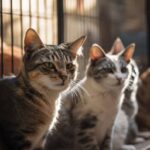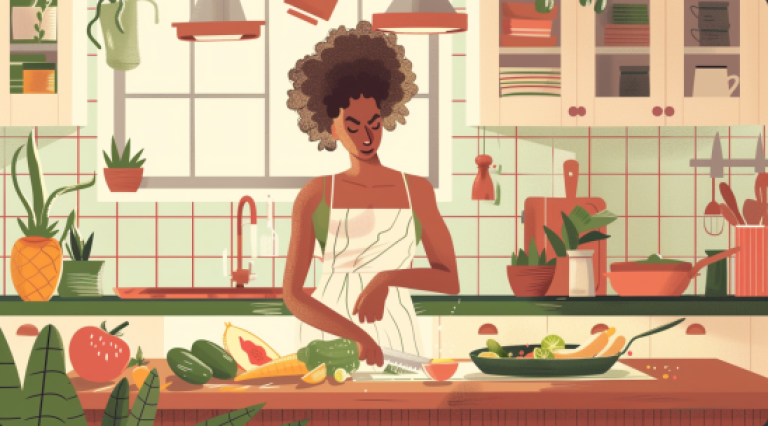Would you prefer to listen to a short podcast discussion about this article? Click on the audio below.
Are you giving cats human food, titbits from your dinner late, or mixing it with their meal? Are you confused about what can cats eat and not eat? Or what human food can kittens eat?
Table of Contents
While cats are obligate carnivores and their primary diet should consist of meat, some human foods can be safe for most cats to eat in moderation.
Giving Cats Human Food – Safe Foods to Give
What human food can cats eat every day? Here are some foods that are fairly safe to give.
Cooked lean meats such as chicken, turkey, and beef.
Cooked fish such as tuna, salmon, and sardines.
Small amounts of cooked vegetables like carrots, green beans, and squash.
Small amounts of fruits like cantaloupe, bananas, and apples (without seeds).
Cooked eggs (avoid giving raw eggs due to the risk of salmonella).
Plain-cooked pasta or rice.
However, please remember that human food should never be a substitute for a cat’s regular diet. We suggest you consult with your vet before making significant changes to your cat’s diet. Additionally, some human foods can be extremely toxic to cats, so avoiding foods like chocolate, garlic, onions, and grapes is highly necessary.

Giving Cats Human Food – Toxic Foods
Many human foods can be toxic to cats, even in small amounts. Here are some common foods that can be poisonous to cats:
Chocolate: Chocolate contains theobromine, a compound that can be toxic to cats and cause vomiting, diarrhoea, and even seizures and death in severe cases.
Onions and garlic: These vegetables contain compounds that can damage a cat’s red blood cells, leading to anaemia.
Grapes and raisins: These foods can, and often do, cause kidney failure in cats; even a tiny amount can be toxic.
Avocado: Avocado contains a toxin named persin that can cause vomiting and diarrhoea in cats.
Alcohol: Even a small amount of any alcohol can be highly toxic to cats and cause vomiting, diarrhoea, and even coma or death.
Coffee and tea: These beverages contain caffeine, which can cause rapid heart rate, muscle tremors, and even death in cats.
Raw meat and fish: These foods can contain harmful bacteria and parasites that can cause vomiting, diarrhoea, and other health problems in cats.

Milk and dairy products: Many cats are lactose intolerant and cannot digest milk and other dairy products, which can cause digestive upset.
It’s important to remember that cats have different digestive systems than humans, and even small amounts of these foods can harm them. Contact your vet immediately if you suspect your cat has ingested a toxic substance.
Also, check out our blog about plants that are toxic to cats
What can I feed my cat if I don’t have cat food?
If you don’t have cat food, you can feed your cat a small amount of boiled chicken or cooked lean meat, as well as cooked rice or steamed vegetables such as green beans or carrots. However, it is important to remember that cats have specific dietary requirements, and prolonged feeding of non-specific food may lead to health issues. Therefore, providing your cat with regular cat food that meets its nutritional needs is advised.
What first aid can I apply if my cat eats toxic food?
If your cat eats toxic food, the first aid you should perform is to contact your veterinarian or a pet poison control hotline immediately. They will be able to tell you what to do next based on the type of food and symptoms your cat is exhibiting. You should avoid inducing vomiting or giving your cat any medications without first consulting a veterinary professional.
My cat eats all human food. Is that okay?
No, it is far from okay for cats to eat all human food. Some human foods can be toxic to cats or cause gastrointestinal upset, which can lead to health problems. Feeding your cat a balanced diet that meets its nutritional needs is important. If you want to feed your cat human food, you should do so in moderation and ensure that it is safe and appropriate for them to eat.
Can I make up homemade food for cats instead of buying cat food?
While making homemade food for cats is possible, it may not provide all the necessary nutrients that cats need for healthy growth and development. Creating a nutritionally balanced homemade diet for cats can be complex, and it is recommended to consult with a veterinarian or a veterinary nutritionist to ensure that the homemade food meets the cat’s dietary needs. Commercial cat food is designed to meet the nutritional requirements of cats, and it is a more reliable way to ensure your cat receives a proper diet.
What is the best cat food to give to my cat?
Choosing the best cat food for your cat depends on several factors, such as age, activity level, and any health concerns. Choosing high-quality cat food that meets your cat’s nutritional requirements is important. Look for cat food with protein, as the first ingredient is well-balanced and primarily made up of whole foods. Some reputable cat food brands include Royal Canin, Purina, and Hills Science Diet. It is advised to consult with your veterinarian to determine which cat food brand and formula is best for your cat.
What are the essential nutrients that cats need in their food?
Cats require a balanced diet that consists of high-quality protein, fat, vitamins, and minerals. Cats’ essential nutrients in their food include: 1. Protein: Cats require a high amount of protein in their diet to maintain their health and support growth and development. 2. Fat provides cats energy and is essential for maintaining healthy skin and coat. 3. Vitamins: Cats require vitamins, such as A, D, E, and K, for the proper functioning of their immune system, eyesight, and other body functions. 4. Minerals: Minerals, such as calcium, phosphorus, and magnesium, are necessary for maintaining healthy teeth and bones. 5. Water: Cats always require access to clean water to prevent dehydration and maintain proper body function. It is important to choose cat food that contains these essential nutrients in the proper balance to help ensure your cat’s nutritional needs are met.
If you require any assistance with this article, please do not hesitate to Contact Us
Help support the Cats Protection League with a monthly donation




















